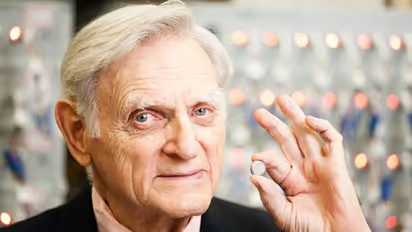John Goodenough, Nobel winner who invented Lithium-Ion batteries, passes away

Synopsis
John B. Goodenough, the 2019 Nobel Prize winner who laid the groundwork for lithium-ion battery that powers today's wireless electronic devices like smartphones, breathed his last at the age of 100. The portable and rechargeable lithium batteries power devices like smartphones, computers, electric vehicles and pacemakers.
Today, we all rely heavily on our cellphones, and many of us may find it difficult to envision life without it. But did you know who made it feasible for these smartphones? The lithium-ion battery that powers modern electronics like smartphones, laptops, tablets, etc. as well as electric and hybrid cars was invented by John B. Goodenough, the 2019 Nobel Prize laureate.
According to the University of Texas, Goodenough passed away in an Austin assisted care home. Nobody disclosed the reason of death. The scientist has over four decades of experience teaching at the university.
Also Read | Nothing Phone (2) Glyph Interface officially REVEALED! Check out the video
Akira Yoshino from Japan and M. Stanley Whittingham, an American scientist of British descent, both shared the 2019 Nobel Prize with him. It took nearly ten years to develop the idea. Each of the three made novel discoveries that provided the foundation for the creation of a widely used rechargeable battery.
Goodenough was raised in America but was born in Germany in 1922. He graduated from the University of Chicago with a PhD in chemistry. At the Massachusetts Institute of Technology, Goodenough started his professional journey.
His work at MIT created the groundwork for the creation of computer random-access memory (RAM). He was also employed by the University of Oxford in England at the time he discovered lithium ions.
Dr Goodenough made a significant advancement in the field of batteries in 1980 while working at the University of Oxford by creating a cathode made of lithium-cobalt oxide. He had enhanced the battery's design created by Dr. Whittingham, a British scientist employed by Exxon. Due to Dr. Goodenough's discovery, lithium-ion batteries now have better energy capacities and greater safety, and they are the preferred power source for many different applications.
Also Read | OnePlus Nord 3 India prices leaked! Here's how much it may cost you
Find the latest Technology News covering Smartphone Updates, AI (Artificial Intelligence) breakthroughs, and innovations in space exploration. Stay updated on gadgets, apps, and digital trends with expert reviews, product comparisons, and tech insights. Download the Asianet News Official App from the Android Play Store and iPhone App Store for everything shaping the future of technology.